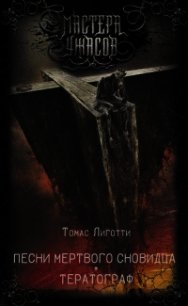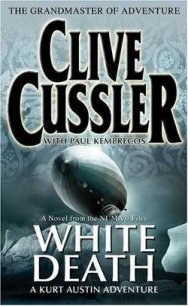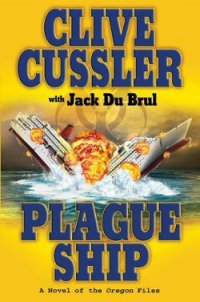Corsair - Cussler Clive (полная версия книги TXT) 📗
The truck swerved when the mangled rim gouged into the soft gravel shoulder. The men in back started to scream as the vehicle tipped further. Still moving dangerously fast, the truck flipped onto its side, skidding down the hill. Some of the terrorists were thrown clear, others clutched the supports to keep themselves inside when it rolled onto its roof. The cab plowed a furrow into the earth before it flipped again, barrel-rolling violently, sheet metal and men peeling away in a cloud of dust.
A second desert-patrol vehicle appeared before the first had settled back on its ruined undercarriage. The driver of this one caught a break. Greg Chaffee had blown through the last of the ammunition in the belt and stood impotently as Linda showed him how to swap it out. The truck dashed down the hill and braked for cover behind the hulking shadow of the locomotive. The men in the bed opened fire at extreme range, and a few lucky hits were close enough to make Linda and Chaffee duck.
Cabrillo had lost precious seconds watching the spectacle and roused himself with an angry shudder. The boxcar’s roof was four feet above his head, and he needed a running start to launch himself so he hit the edge with his chest. Kicking at the smooth metal sides and straining with his arms, he hauled himself atop the car and looked forward. The first curve was a quarter mile away, and they had sped up to at least twenty miles an hour.
He knew from the map Eric had e-mailed from the Oregon that this was a long, sweeping corner taking the tracks around the very top of this mountain and that the grade started to fall away as soon as they entered it. Twenty miles an hour was okay going in, but if they continued to accelerate eventually they would lose control of the boxcar.
Juan moved all the way to the front of the car where a rusted, four-spoked metal wheel gave him control over the car’s mechanical brakes. In the days before George Westinghouse invented his fail-safe pneumatic-braking system, teams of brakemen would ride atop trains and turn devices like this one to squeeze the pads against the wheels in an uncoordinated and often deadly ballet. Cabrillo prayed as he grasped the wheel that it wasn’t frozen solid by rust, and that after the decades the car had been used on the line there were any brake pads remaining.
Prepared to heave with all his strength, he cursed when the wheel spun freely in his hands. It felt like it wasn’t connected to anything, but then he heard the squeal of metal on metal as the old brakes clamped over the top of the car’s wheels. They worked after all and had been recently greased. Grinning at his luck, he cranked the wheel another half turn, and his elation turned to dismay. The added pressure should have tightened the brake pads further and changed the pitch of the screech coming from the wheels. It didn’t happen.
They had brakes, yes. But not much.
The Pig pushed the freight car into the turn, and Juan lost sight of the ore-loading superstructure as it vanished around the hilltop. To his right, he had a commanding view over another valley and, as if to remind him of their predicament, a string of ore cars that had left the tracks a hundred years before at its bottom, looking like discarded toys. If he had to guess, the steam engine that had gone over with them probably had five times the Pig’s horsepower.
“Linc, you there?” he radioed.
“Yes.”
“What’s our speed?”
“Twenty-eight.”
“Okay, don’t let it go past thirty. We don’t have much braking left on the boxcar.”
“Is that bad?” Linda asked over the net.
“It ain’t good.”
There were ladder rungs welded to the front of the car, so Cabrillo climbed over and down. Next to him was the shaft that linked the wheel above to a worm gear that activated the brakes. Juan hooked his legs around the forward coupling and braced one hand on a stanchion so he could peer under the edge of the car. Creosote-blackened railroad ties zipped by inches from where he dangled. A stone was lodged between the turning rod and the worm gear. When he twisted the wheel, the stone had kicked the gear’s teeth out of alignment so it turned without activating the brakes. Redoubling his grip, he stretched until his chest was under the car. Weeds growing in the old railbed whipped his cheek and face.
His fingers sank into the grease that coated the gear, but no matter how he tried he couldn’t get a grip on the tightly wedged stone chip.
“Screw this,” he muttered, and reached behind his back for one of his automatic pistols.
His body swayed as he drew it, and for a moment he was looking up the tracks. A metal jerry can had fallen from an earlier train or been left between the rails by one of the work crews. Juan was hurtling toward it at more than thirty miles per hour and didn’t have the time or leverage to pull himself clear. Hanging practically upside down, he aimed at the can and opened fire as fast as the gun would cycle. The high-velocity bullets from the FN Five-seveN punched through the can’s thin sides without moving it. He was ten feet from having his face smashed into the container when a round caught on one of its corner seams and sent the can skittering harmlessly away.
He twisted back and fired the last round at the worm gear. The rock popped free and fell away.
“Now, that’s what I’m talking about,” he crowed, high on accomplishment and adrenaline.
“Repeat that, Chairman,” Linc asked.
“Nothing. I think I’ve fixed the brakes.” He straightened himself up and reached for the ladder. “What’s our speed?”
“Thirty-four. I’m using the Pig’s brakes, so that carbon-fiber dust is blowing off the pads something fierce.”
“No problem. This is why we started in reverse. Throw her into first gear and start slowing us using the engine. I’ll get on the brake up here, and between the two we should be okay.”
Juan reached the top of the boxcar. They had dropped a hundred feet or so from the mountain’s summit as they curled around its flank. Above them, the hillside was sparse scrub. Then he saw that there was a road that ran parallel to and slightly higher than the railbed. He only noticed it because of the dun-colored truck that emerged from around a bend and started pacing the train as it glided down the tracks.
A man with his head wrapped in a ubiquitous kaffiyeh stood bracing himself in the back of the truck. Cabrillo had left his REC7 on the boxcar’s roof when he’d crawled down to fix the brakes. He lunged up and over the front of the car at the same instant the fanatic leapt from the speeding truck.
His defiant scream was lost in the wind as he arced though the air. Juan’s fingers had closed around the rifle’s barrel when the man crashed onto the roof close enough to send the weapon skidding toward the side. Jacked up on even more adrenaline than Cabrillo, the man shouted a battle cry and kicked Juan full in the face.
Cabrillo’s world went dark in an instant, and only started returning in painfully slow increments. When Juan was somewhat conscious of what was happening, the terrorist had pulled his AK-47 from around his back and was just lining up. Juan rolled over and scissor-kicked his legs, twisting on the hot steel roof enough to catch the man in the shin. The AK stitched four holes into the roof next to Juan’s head, and inside the car someone screamed out in pain.
Goaded beyond fury, Cabrillo reached up and grasped the weapon by its forward grip. As he pulled down, the gunman reared back and actually helped pull the Chairman to his feet. Juan fired two punches into the gunman’s face. The Arab was so intent on keeping his weapon that he didn’t defend himself. Juan landed two more solid blows, and over the terrorist’s shoulder saw two more men preparing to leap for the train.
He rammed his elbow into his opponent’s stomach as he rolled into him, turning them both so that when he grabbed at the guy’s right hand and forced his finger onto the trigger the AK’s barrel was pointed back at the truck. The spray of tracers caught one of the men just as he gathered himself to jump. He fell out of the side of the truck and vanished under its rear wheels, his body making the vehicle bounce slightly on its suspension.




